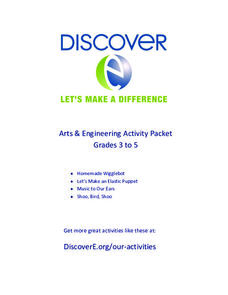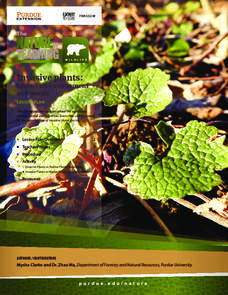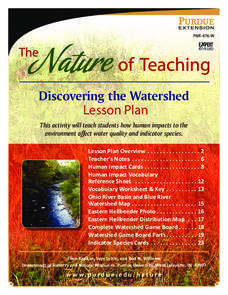DiscoverE
Arts and Engineering Activity Packet: Grades 3-5
Art and science sometimes go hand in hand. A set of four activities for learners in grades 3-5 teaches engineering concepts as part of art projects. Class members build homemade robots, elastic puppets, musical instruments, and...
National Wildlife Federation
Spider Sensations
Know that feeling when walking into a spider's web? Feel it from the other end! Scholars learn about the body parts of a spider and the specific spiders known as orb-weavers. Groups play a game to figure out how a spider finds its food...
Acoustical Society of America
Sound Measures
How loud is the class's hearing threshold? Using a sound level meter, the class members observe how the loudness of sound is affected by distance. Learners continue to study decibels by seeing how different sounds compare to each other...
National Woman's History Museum
Seneca Falls and Suffrage: Teaching Women's History with Comics
As part of the study of women's history, young scholars examine Chester Comix's strips about the Seneca Falls Convention and four 19th century leaders in the struggle for equal rights. After researching other elements of the Suffrage...
National Woman's History Museum
Women of Wonder: Who Do I Admire?
Celebrate superwomen during Women's History Month with a lesson that showcases a variety of female role models. Following a whole-class discussion on superheroes, role models, respect, and admiration, scholars listen to several...
National Woman's History Museum
Susan B. Anthony: She's Worth a Mint!
A instructional activity all about Susan B. Anthony showcases the Civil Rights leader's contributions towards equality. A Susan B. Anthony coin sparks engagement. Scholars take part in a discussion that sheds light on what being an agent...
Luana Game
Women in Science DIY Kit
A card game sheds light on famous women in science. Pairs or small groups collect and exchange color-coded cards. Four cards of the same color make a science lab. The first player to create three labs wins the game! Each card features a...
Purdue University
Eco-llapse
A balanced ecosystem doesn't mean balanced populations. Budding scientists complete a series of activities to learn about the relationship between producers and consumers in an ecosystem. They complete the wildlife conservation...
Purdue University
Mammals and Ecosystems
Mammals have unique interactions with their ecosystems. Using a multi-part lesson, learners research local mammals using recommended websites and use their findings to create their own paper ecosystems including appropriate mammals. They...
Purdue University
Ashes to Ashes: We All Grow Up
Ecosystems are constantly changing whether people notice or not. An inquiry-based lesson examines types of ecosystem changes and how they relate to wildlife conservation. Learners classify changes as succession and disturbance using a...
Purdue University
Reptiles, Amphibians, and the Scientific Method
What do a reptile and an amphibian have in common? A three-part lesson allows scholars to investigate the similarities and differences between the two types of animals by identifying specific body parts. The lesson highlights the...
Polk Bros Foundation
Chicago: Choices and Changes
Chicago, a city that is ever changing. A thought-provoking lesson, geared toward third-grade social studies, explains how the city of Chicago has changed over time. It discusses important leaders to the founding of the city, like Daniel...
Purdue University
Food Waste Solutions
Easy doesn't always mean better. In an era with pre-packaged everything, learners consider the environmental impact of the convenient trend. They critique the packaging of food and how waste impacts cost and then look for solutions.
Purdue University
Food Waste and the Environment
Out of sight out of mind can be a dangerous habit. Learners investigate the life of food waste after it leaves people's homes and its impact on the environment. They complete a series of three activities that involve building a mini...
Purdue University
Trees of the Midwest
All trees are not created equal. A set of three wildlife conservation lessons has learners examine the characteristics of individual trees. They look at the life cycle of the tree using a story and reference a field guide to identify...
Purdue University
Take-a-Hike
Learn about nature and health all in one set of lessons. Individuals use a scavenger hunt to record observations during a nature hike. They then complete activities to categorize their observations and rate the health of the habitat for...
Purdue University
Invasive Plants: Impact on Environment and People
It's the attack of the invasive species! Young scientists simulate the behavior of an invasive species with a game-like activity. They assume the roles of native plants, invasive plants, and resources and watch the invasive plant takes...
Purdue University
Coloration Exploration
Finding an animal in nature can be like a game of hide and seek. A thorough lesson plan explores different coloration strategies of animals. Pupils complete look-and-find puzzles and coloring sheets to differentiate between different...
Purdue University
Discovering the Watershed
Human impact on watersheds can make or break an ecosystem. Learners use a game to learn about the impact human choices have on water quality and the organisms that depend on it. The activity includes a game board and game cards that tell...
Purdue University
Healthy Water, Happy Home
Clear water does not mean clean water. A collaborative lesson has groups play a board game to identify sources of water pollution and develop strategies for improving water quality. Their investigations include reference to the water...
Purdue University
Mammal Food Webs
You are what you eat—or at least a part of what you eat. Budding scientists examine owl pellets to develop their own food webs. They use tooth and skull identification techniques to classify what they find.
Purdue University
Let’s Go Outside
Nature is good for the soul. The final activity in the fine-part Family Nature Program series discusses the benefits of having an active connection with nature. Learners complete an imagery activity that relates nature to a calming...
Purdue University
Explore Your Habitat
Get a hands-on look at a local habitat. A three-part activity begins with a discussion of the characteristics of a local habitat. Pupils then test their knowledge by playing a game to match animals to their habitats. Finally, they go on...
Purdue University
Tree Talk
Examining tree rings shows more than just age. The third installment of a five-part Family Nature Program unit has learners examine all parts of trees including tree rings to tell stories about the life of the tree. They then use their...

























